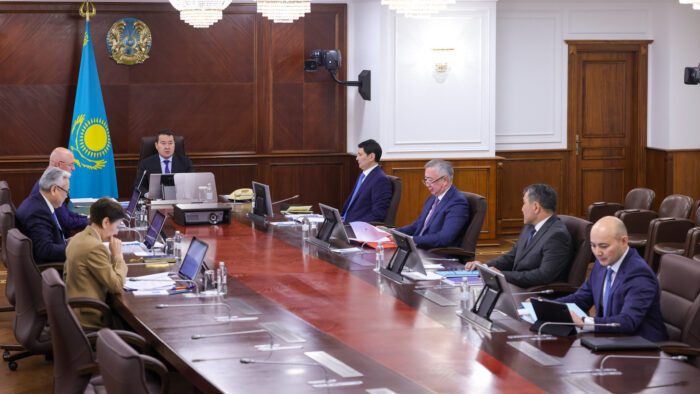ASTANA – Allocating funds to bolster 40,000 ongoing and 20,000 new small and medium-sized enterprises (SMEs) projects is a key priority outlined in this year’s budget, announced Alibek Kuantyrov, Minister of National Economy, during a Jan. 30 meeting chaired by Prime Minister Alikhan Smailov, reported the Prime Minister’s press service.

Measures to support small and medium-sized enterprises were discussed at a Jan. 30 government meeting chaired by Prime Minister Alikhan Smailov
Kuantyrov underscored the government’s commitment to systematically improving the business environment, streamlining administrative processes, and nurturing growth within the entrepreneurial sector.
The Business Roadmap (BR) and Economy of Simple Things (EST) programs, fundamental tools in this endeavor, have witnessed substantial demand. Last year alone, subsidies for interest rates on loans supported over 12,000 business projects, reaching one trillion tenge ($2.2 billion), with an additional 8,000 projects receiving guaranteed assistance, worth 40 billion tenge ($756.9 million).
Over 10,000 entrepreneurs have participated in training programs, while more than 166,000 have sought various consultations to enhance their business operations.
Kuantyrov outlined a comprehensive program integrating government support measures through the BR and EST programs, focusing on cultivating competitive, import-substituting, and export-oriented industries. The budgetary allocation for subsidizing new projects will predominantly benefit manufacturing enterprises.
The program envisions a gradual transition from subsidies to guarantee instruments and other support mechanisms. Loan guarantees are set to increase to 3.5 billion tenge ($7.7 million), with an expanded scope of economic activities eligible for assistance.
Prime Minister Smailov reiterated the government’s unwavering support for domestic entrepreneurs. Noting the significant progress made, he highlighted that small and medium-sized businesses now contribute 36.5% to the country’s gross domestic product, with a projected increase to 40% by 2030.
“To achieve this objective, we are implementing a new regulatory policy in entrepreneurial activities, enhancing the effectiveness of incentive measures for business activation. To date, 9,000 redundant requirements have been eliminated, with plans to eliminate the remaining 1,000 under an upcoming business conduct bill,” said Smailov.
Smailov also announced the implementation of an automated risk management system in control and supervision areas. This move aims to significantly reduce scheduled business inspections and instances of entrepreneurs’ liability.
Tax incentives introduced, including a 4% retail tax regime implemented last year and a single payment from the payroll fund, have alleviated the financial burden on micro- and small businesses, reducing rates from 34.5% to 20%.
Nevertheless, challenges persist, notably the capacity of local executive bodies to meet the growing demands for basic infrastructure connections.
“Regions must expedite the establishment of engineering networks and communications for the timely commissioning of planned projects,” emphasized Smailov.
He also stressed the necessity of transitioning to a service-oriented tax model to further SME development, emphasizing the importance of supporting businesses.
“It is imperative to accelerate the development of norms to incentivize new manufacturing projects by abolishing certain taxes for three years and optimizing the number of taxes by 20%, along with tax reporting forms by 30%,” he added.
